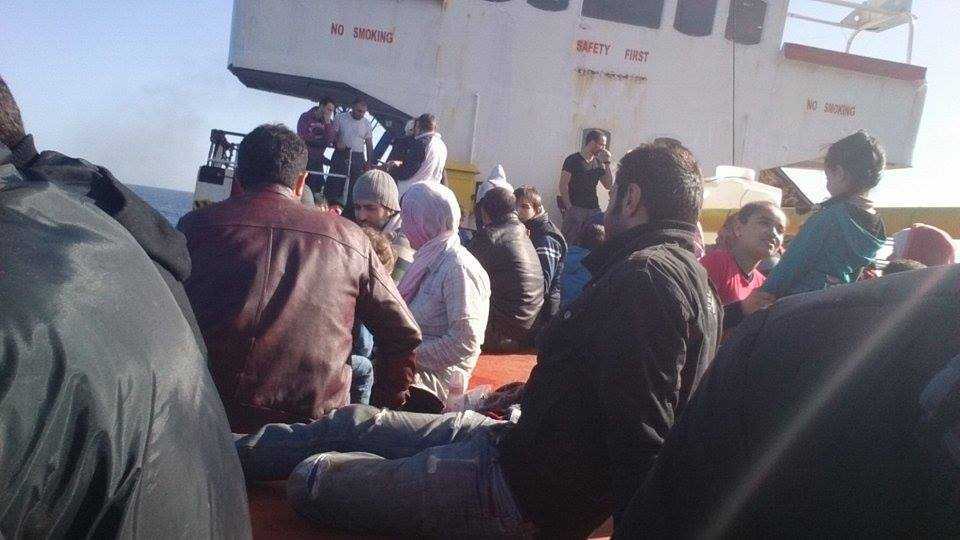Abandoned at sea: A Syrian’s journey to Germany
The deaths of an estimated 700 migrants off the coast […]
22 April 2015
The deaths of an estimated 700 migrants off the coast of Libya earlier this week has brought international attention to refugees seeking safety by crossing the Mediterranean Sea.
Each year thousands of Syrians—lacking an alternative safer or legal route—undertake the perilous passage across the water in hopes of finding refuge in Europe.
For many Syrians, the most common route into Europe is escaping to Turkey where they are smuggled onto boats and transported to Italy.
Here is the story of one such Syrian who helped save his own life and the lives of his fellow migrants while adrift at sea.
The journey, which began in late 2014, took him from Damascus to Lebanon before flying to Turkey and being smuggled to Italy via boat, says Mohammed Wanly, a 31 year old journalist who recently arrived in Germany.
The captain of his ship abandoned him and the other migrants at sea off the Italian coast, he tells Syria Direct’s Mohammed al-Haj Ali, before he found a satellite phone that he used to call his friends who facilitated the rescue of the boat.
Q: What prompted you consider leaving Syria by way of smuggling?
When the revolution began, I didn’t have any intention to leave Syria even after I was arrested four times during the conflict.
What changed my mind was the government law enforcing mandatory military service. This law forced me to leave my country.

Q: What kind of problems and hardships did you face going to Lebanon from Damascus?
The hardest part were the insults at the Lebanese border crossing. The only reason I was allowed to enter Lebanon was because I was a journalist.
The road from Damascus to the Lebanese border was not very difficult; I paid 120 thousand SP to pass through the regime checkpoints.
Q: How did you find the smuggler? How much did you pay him?
I found him through my friend who was also looking to escape. My friend knew the smuggler and dealt with him. We never saw the smuggler face to face, but we saw his assistant. No one can meet the smuggler himself, but we all knew that the smuggler was Syrian—they are all Syrians.
After we called the smuggler we met his assistant in a hotel and agreed to terms with him. We gave $6000 to a third party, and agreed that when we reached Italy we would call this person to give the money to the smuggler.
Q: What were the challenges you faced you when travelled to Italy from Turkey? How long did the trip take you?
There are many hardships at sea. The boat is about 40 meters long, and there was very little food and drinking water; many people were on board and there wasn’t space for restrooms or showers. People had sea sickness and it was normal to see them puking. The boat was dark and covered, which created a bad smell and caused skin diseases.
Later, the captain and his crew fled the boat and left us alone. We found out that the captain was lost at sea because he left us 160 miles away from the Italian coast. We spent the entire day sending emergency calls, but no one responded.
By coincidence, we found a satellite cellphone that the captain either forget or left on purpose. I called my journalist friends and they spread the news about us. After about 20 hours, a cargo ship came and rescued us. No one was hurt.
I had a very crucial role on the boat because, as I told you, I am a journalist with contacts so people were relying on me. I was the last person to leave the boat after I made sure that everyone else was safe.
The smuggler and the captain did not give us any safety equipment. The trip took nine days from Turkey to Italy.
Q: How many Syrians were with you? Families or only men?
We were around 350. All of us were Syrians except two Iraqis and nine Palestinians. There were children, men and women. Some of the women were pregnant.
Q: How many times did you change boats or ships?
In Turkey, there were cars that drove us from the hotel to the Turkish shore. Afterwards, we boarded a small boat that carried us to another, before that one took us to the real boat that sailed on to Italy.
Q: What was situation like when you reached Italy? How did they treat you?
The Italians treated us very nicely and respected us. They gave us food and water. The Red Cross was there and they registered our names. There was a bit of delay, but they did not bother us at all. Then they moved us to the refugee camps.
I fled from the camp and took a taxi to another city in Italy. Then I travelled by train to Milan before going to Germany.







